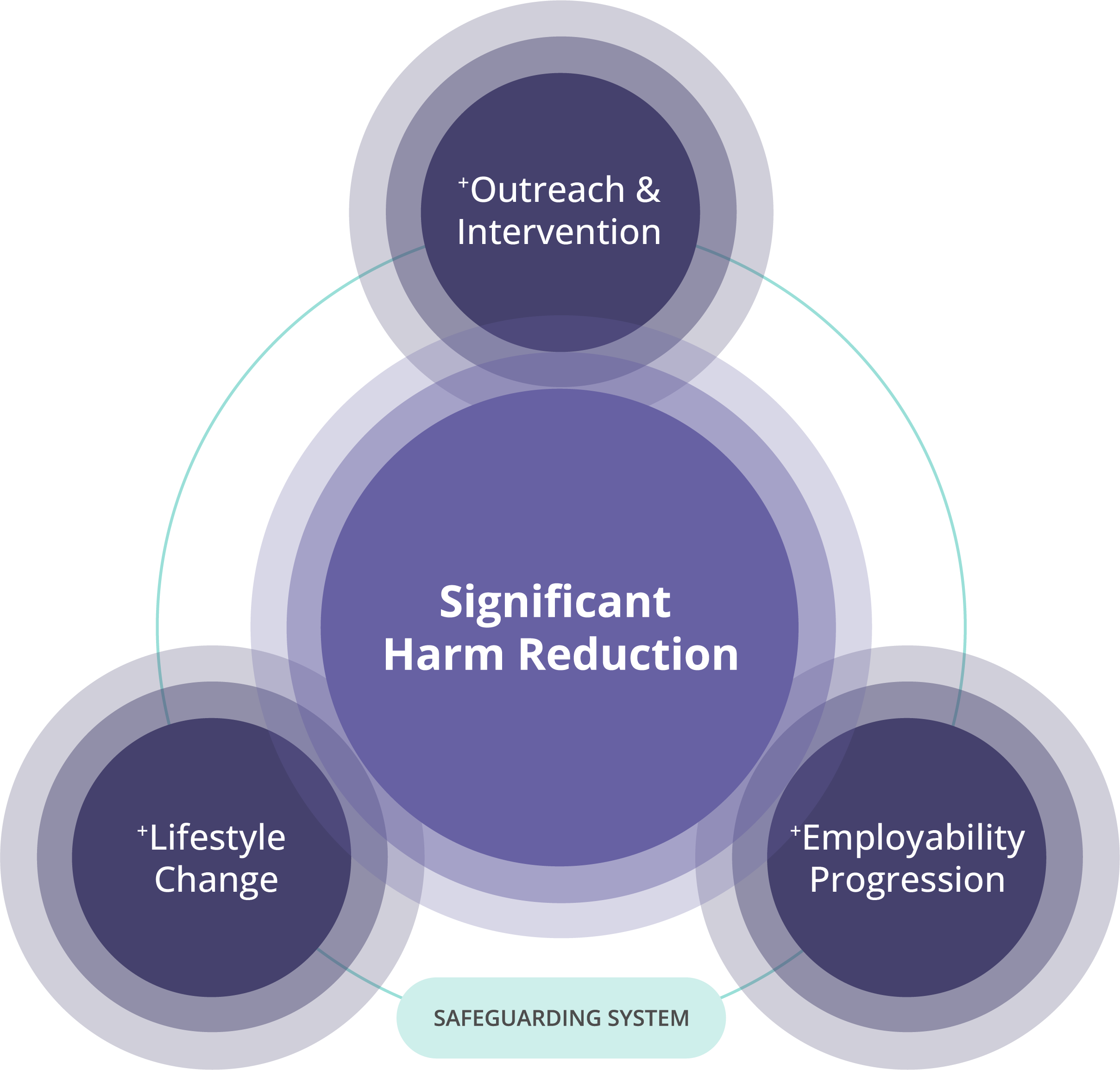Our Approach
Appropriate Intervention Plus Model (AIM+)
Our Appropriate Intervention Plus Model is a robust approach that incorporates ‘systems thinking’ disciplines to continually inform and transform the way we interconnect targeted outreach, intervention, and cognitive behavioural skills development for significantly reducing harm and create safety and stability in a young person’s life. It also innovatively interweaves our ‘transition into employability’ component, which combined makes for a more comprehensive system of interrelated interventions that truly equip young people to progress and maintain their personal, social and economic development – independent of us.
Drawing from our on-going overseas research and collaboration, together with our own remarkable three decades of international award-winning youth intervention in East London, in partnership with Impetus we are currently further refining and advancing our theory of change delivery model.
How We Do It
Our 3-Phase Change Programme
Each young person enrolled on our outreach & intervention, lifestyle & employability progression programme is partnered with their own Intervention Coach and Employability Coach. Please note: Our approach is not a quick fix. The young people we re-engage are caught up in harm and are seriously stuck for a reason, and require a comprehensive set of longer-term interventions and timeframes. This is why we are committed to supporting young people for the long haul and providing intensive support for up to two years, with an additional third-year post-programme follow-up to ensure they maintain their change, independently of us.
Follow-up
Many of the young people we re-engage have often had previous bad experiences of change and can be distrustful of professional organisations. They don’t simply walk through our doors to engage us, and may reject all initial efforts made to begin to engage them. Our Outreach & Intervention Coaches go into the council estates where young people live, and onto the streets they hang out, developing trust and relevance in what we define as ‘Building a Relationship for Change’. Our programme starts with us and our ambition and determination to re-engage those who, for whatever reason, have become disconnected and in harm’s way.
-
The Lifestyle Change element of our programme is for significantly reducing harm in a young person’s life and equipping them with vital cognitive behavioural skills (CBS) for positive behavioural and emotional regulation. For example, even when a young person starts to engage our programme, there will inevitably be many relapse setbacks on the part of the young person that staff support them to address using (CBS) to better understand and overcome behaviours keeping them stuck and in harm. Here, our staff are supporting young people inside our building and out in the community because we deeply understand and empathise that it is not easy for a young person to try and change whilst still living in neighbourhoods where they and their peers may still be involved in criminality and harm.
This is why our Lifestyle Change element factors in a young person’s lived environment so they are safer on the streets and on their council estates where they can more positively socialise, live and go to work or training. Building trust to engage the contexts in which young people live and hang out is crucial. This includes improving the way young communities are included and actively involved in the community development and regeneration opportunities in their neighbourhoods and borough through our Social Action Projects where they are supported to run and take part in events in their neighbourhoods that give them a voice and presence and work experience into the Employability element of our programme.
-
The Employability Progression element of our intervention programme is developed around a young person’s readiness, ability and capability to engage and transition into employment and or relevant education and training. This includes building a professional growth and success mindset for one’s career of choice and being able to operate within professional adult working environments and industry sectors. We are Not a recruiter that simply tries to find any jobs for young people. We coach young people to be true and honest about their current realities and skill sets, set their desired career ambition for their future, and then further coach and equip them to work with all the leadership challenges and tensions that come with equipping and enabling young people to be “employ-able”. We don't simply refer a young person on in this context!
Our Employability Coaches deliver services that support participants to build aspiration, motivation and self-confidence for strengthening key employability skills that are also transferable for work and their lived environment. They accompany young people in this transformational journey, matching them up with professional Mentors and experts in their chosen fields, work placements, on-site visits, until they advance to maintaining and self-sustaining career-relevant training and employment with confidence, competence and resilience.
Trauma-Informed Practice:
Healing from Trauma is a profound and non-linear process, marked by both progress and setbacks. We provide practical strategies to reignite self-belief, hope and effort throughout a young person’s change journey with us.
Relapse:
Relapse setbacks are actually part and parcel of anyone’s change process and a completely natural and often common occurrence for people that are also taking on the difficult task of working through trauma. Setbacks, while discouraging, are not necessarily indications of failure but reminders that growth and healing is occurring. We coach young people to understand that no matter how challenging the setback and how many they may have with us, setbacks can be viewed as opportunities for immense learning and resilience.




